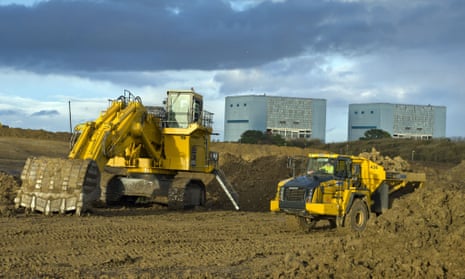George Osborne has vowed to confront anxieties over Chinese involvement in Britain’s nuclear energy sector after announcing a £2bn government guarantee for the delayed and controversial Hinkley Point power plant project in Somerset.
Speaking in Beijing on the second day of his five-day tour of China, the chancellor said the project in south-west England was “a win-win-win for the UK and … a great example of how the relationship with China has a direct material benefit to the people living in our country”.
“I think we have to confront any anxieties that exist out there about Chinese investment in British civil nuclear power,” Osborne told a press conference in Beijing.
The initial backing from the British government would pave the way for the construction of Britain’s first new nuclear power station for a generation, Osborne said, as he redoubled his arguments for nuclear in the face of opposition from environmental groups.Addressing concerns over Chinese involvement, Osborne said: “The truth is this: the reactor – which is actually a French reactor – can only go ahead if it is signed off by our nuclear safety experts and there are plenty of rules that exist to protect the British people from the misuse of civil nuclear power and to make sure that our nuclear power stations are completely safe.
“For me personally, it is a tragedy that for two decades we gave up on building these nuclear power stations. This government is determined to get back into building nuclear power stations. We are going to secure reliable low-carbon energy for the future. But instead of me committing tens of billions of pounds of British taxpayers’ money to these nuclear power stations – which is money I would otherwise be able to spend on the health service or the education system or indeed give lower taxes to people – instead of that we have created a model where we can attract Chinese investment into civil nuclear power.”
Osborne said Chinese involvement in Hinkley Point “opens the door for majority Chinese ownership of a subsequently nuclear project in Bradwell.”
London and Beijing had also agreed to set up a “cutting-edge” £50m nuclear research centre, the chancellor announced.
The Hinkley plans have been beset by problems and the plant’s developer, EDF, the French energy group, recently admitted it may be further delayed.
Amid concerns over when Chinese backers will commit investment to the plan, the project has come under intensifying criticism from the energy industry and the City. Analysts have questioned the economics of a project that, at £24.5bn, could cost as much as the combined bill for Crossrail, the London 2012 Olympics and the revamped Terminal 2 at Heathrow.
But there has been no sign of the government wavering in its commitment. EDF has already won a generous financial aid package from the government through its “contract for difference” mechanism but has yet to sign the definitive deal it needs with Beijing investors.
The Treasury said Osborne’s announcement of an initial government guarantee for the project would smooth the path to a final investment decision by EDF, supported by China General Nuclear corporation and China National Nuclear corporation.
A breakthrough is expected when the Chinese premier visits the UK next month, leaving EDF in a position to finally give the green light to the first nuclear plant to be built in the UK for 20 years.
The government hopes the construction and operation of Hinkley Point C will create thousands of jobs in Somerset and more widely in the nuclear industry across the UK, as well as boosting Britain’s energy security. The new plant is expected to produce enough energy to supply 7% of the country’s needs, powering around 6m homes, the Treasury said.
Vincent de Rivaz, the chief executive of EDF Energy, said Osborne’s approval of an infrastructure guarantee was a “clear sign” of the government’s commitment to Hinkley Point C.
“It is further progress towards a final investment decision on a project which will provide reliable, affordable low-carbon electricity for decades,” he added.
Last week, three leading environmentalists who broke ranks to give their support to a new generation of nuclear plants joined together to urge the government to scrap plans for Hinkley Point C.
George Monbiot, Mark Lynas and Chris Goodall said the soaring cost of, and delays to, the Hinkley project left ministers with no option but to pour the estimated £24.5bn-worth of investment into other low-carbon technologies.
Greenpeace UK’s chief scientist, Dr Doug Parr, said: “This announcement is a PR smokescreen to give the impression that this project is moving forward when it’s actually bogged down in a swamp of troubles. Hinkley hasn’t got funding or safety clearance, and everyone outside the nuclear industry and our blinkered government thinks it’s absurd, yet the chancellor is ignoring them all to plough ahead with this overpriced, overrated and overtime project.”

Comments (…)
Sign in or create your Guardian account to join the discussion